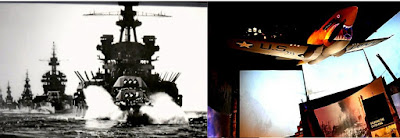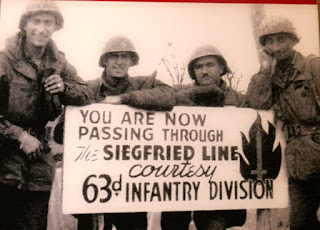The
D-Day exhibit is a permanent exhibit in the entry building (Louisiana Pavilion) at the
National World War II Museum in New Orleans, Louisiana.
D-Day was 6 June 1944 and was known as
Operation Overlord.
As you enter, you view a full size replica of the Telemetry Room of the Riva Bella Fire Direction Tower at Normandy. Nearby is a model of the full tower.

The packs carried by the soldiers contained a selection of items, which are included in various displays.




Early on, paratroopers took off from airfields in the south of Britain. They landed at pre-selected drop zones in Northern France.

But some troopers were "dummies" used to deceive the enemy.

The landings on the five beaches continued through the day. Several enlarged photos tell the story.
 |
| Juno Beach |
 |
| Sword Beach |
The Canadians were amongst the first of the allies that began to build an invasion force in December 1939. After America entered the war in 1941, they send more than 1.4 million troops in 1943 and 1944.
Eventually, over 2 million troops joined forces by D-Day. In addition to the USA, UK, and Canadians were Australian, Belgian, Czech, Dutch, French, Greek, New Zealand, Norwegian, Rhodesian, and Polish troops and support personnel.
The invasion was the largest multiforce (naval, air, land) invasion in the history of the world.
The combined forces served under the command of American General Dwight D. Eisenhower.
How many died? Estimates from the
D-Day Museum list more than 425,000 Allied and German troops killed, wounded, or missing during the battle of Normandy.
The allies captured about 200,000 German prisoners of war.
The five beaches of the Normandy D-Day Invasion (IWM)
Utah - US 4th Infantry Division
Omaha - US 1st and 29th Infantry Divisions
Gold - British 50th Division
Juno - Canadian 3rd Division
Sword - British 3rd Division
See Part I for more information on the National WWII Museum.
Related Posts
NATIONAL WW II MUSEUM
D-DAY EXHIBIT
PATH TO TOKYO
WW II MEMORIAL, WASHINGTON DC
HOLOCAUST MUSEUM DC
MY WEB PAGE
www.suttong.com











































